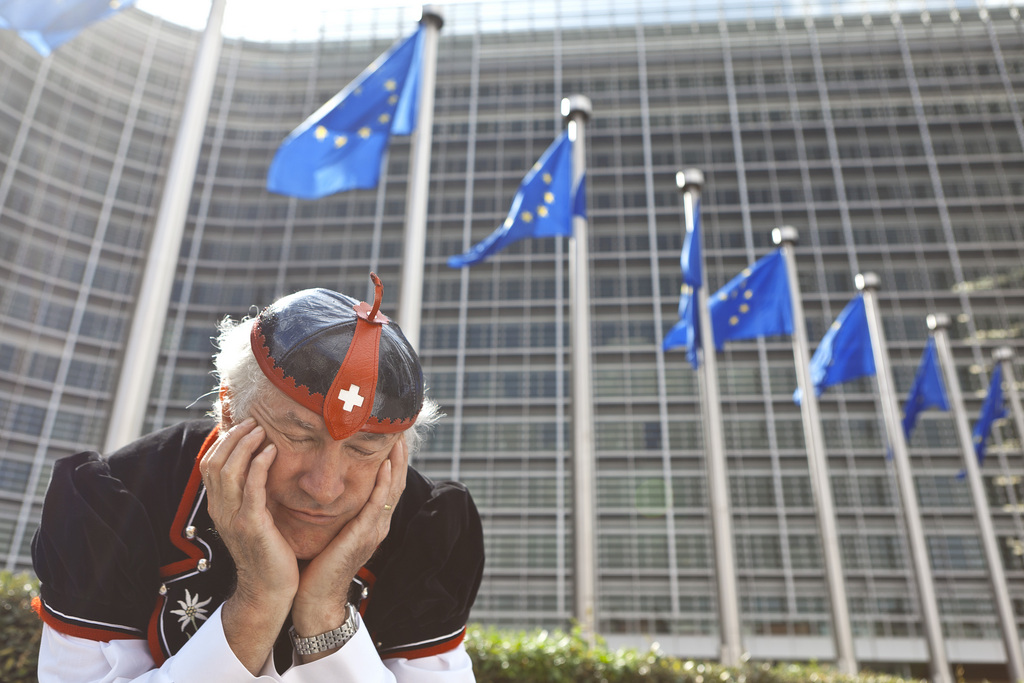
EU repeats its objections to Swiss proposals

A firm letter sent by European Commission President José Manuel Barroso to Switzerland on the issue of bilateral accords, has provoked contradictory interpretations from Swiss parties and newspapers.
In the newly-surfaced letter to last year’s Swiss president, Eveline Widmer-Schlumpf, Barroso repeats the EU’s insistence that all agreements with Switzerland must include an obligatory legal mechanism to ensure that they will be automatically adapted to constantly evolving legislation.
He refers to a document approved by the EU transport and energy ministers at the end of 2012, which drew up a list of complaints against Switzerland, and which declared that bilateral accords concerning the domestic market were “at a dead end”.
What does it all mean?
Reacting to the letter, the centre-right Radical Party described it as “much ado about nothing”.
It said it was clear that the existing bilateral accords were not being called into question, but commented that “future negotiations will be difficult”.
It pointed out that trade between Switzerland and the EU was worth at least a billion francs, and that this had created numerous jobs in both Switzerland and Europe.
The Neue Zürcher Zeitung, which titled its report on the news “Friendly but firm”, commented that the Radical Party’s way of reading the letter was “not obvious”.
For its part, the rightwing Swiss People’s Party said Switzerland was not obliged to reach any new agreements with the EU.
“Acceptance of the EU demands would be tantamount to accepting a colonial treaty and allowing itself to be blackmailed,” it commented.

More
Brussels airs grievances with Bern
Consistency
Barroso’s letter is a response to a letter sent by Widmer-Schlumpf on July 15, 2012 setting out Switzerland’s ideas for the way in which its relations with the EU should develop.
The response, dated December 21, did not come to public attention until Thursday, when the Radical Party published a reaction to it, having discovered it in what the NZZ called “a practically unfindable place” on the foreign ministry’s website.
Although couched in conciliatory terms, Barroso makes clear that the Swiss suggestion that there could be exceptions to the adaptation of agreements is “problematic” for the EU, which wants to ensure that the law remains consistent.
While welcoming Swiss willingness to refer to the Court of Justice of the European Union – the body whose mandate is to ensure that the law is observed in the application of treaties – over the interpretation of agreements, he rejects Swiss demands that only Swiss judicial bodies can rule on possible violations, and repeats the EU view that there must be independent international mechanisms to monitor and implement legal decisions.
Nevertheless, he stresses that the EU wishes to “deepen” its “important relations with Switzerland”, and praises Switzerland’s “generous solidarity” – its contributions to the so-called cohesion fund – towards the new members of the enlarged EU.
Top-level negotiators from the two sides are due to meet on January 29, when further Swiss contributions to the new members – including Croatia, due to join on July 1 – will be on the agenda.
The People’s Party commented in its response that further contributions to the cohesion fund were “out of the question”.
Switzerland and the EU have concluded more than 120 bilateral accords on a broad range of issues.
They include the 1972 free trade treaty and the 1999 free movement of people labour accord, regulating access to the labour markets of Switzerland and the 27-nation bloc.
In 1992 Swiss voters narrowly rejected the European Economic Area treaty, a halfway house to EU membership.
Brussels wants Switzerland to take over EU law automatically pertaining to the accords and an international arbitration body to rule in controversial cases.
Under domestic pressure to stem immigration, the Swiss government last year decided to limit the number of workers from eight eastern EU member states.

In compliance with the JTI standards
More: SWI swissinfo.ch certified by the Journalism Trust Initiative





























You can find an overview of ongoing debates with our journalists here . Please join us!
If you want to start a conversation about a topic raised in this article or want to report factual errors, email us at english@swissinfo.ch.